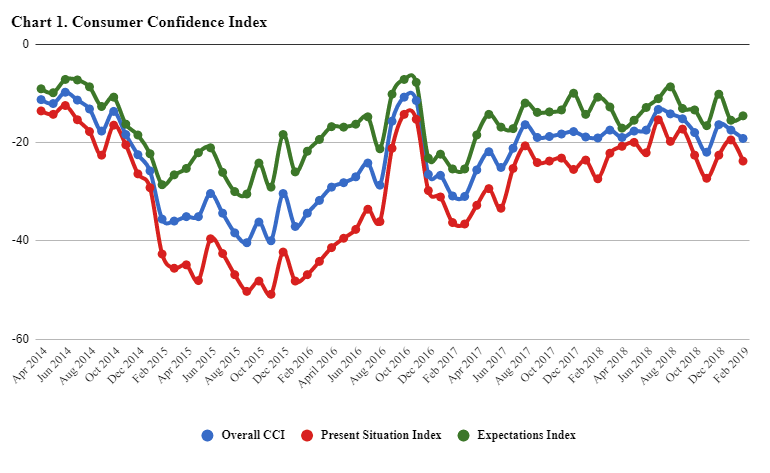- Details
According to a nationally representative sample of 320 Georgians, interviewed in early April 2019, the Consumer Confidence Index (CCI) decreased by nearly two index points, from -18.9 in March to -20.8 in April. A similar pattern was observed in one of the sub-indices: the Expectations Index declined by 4.3 index points (from -14.1 to -18.4) compared to March, while the Present Situation Index experienced a slight improvement, by 0.3 index points (from -23.6 to -23.3). Table 1, displayed below, elucidates which particular questions were affected by various expectations and are responsible for the drop in the Expectations Index: in both expected inflation and expected unemployment.
- Details
According to a nationally representative sample of 339 Georgians interviewed in early March 2019, the Consumer Confidence Index (CCI) slightly improved by 0.3 index points, from -19.2 in February to -18.9 in March. A similar pattern was observed in both sub-indices: the Present Situation Index increased by 0.2 (from -23.8 to -23.6), and the Expectations Index by 0.4 index points (from -14.6 to -14.1) compared to February. It is worthwhile to mention that spring season seems to affect consumer confidence positively since 2015 (although data for April 2019 are not accessible yet).
- Details
According to a nationally representative sample of 341 Georgians interviewed in late February 2019, the Consumer Confidence Index (CCI) dropped by 1.7 index points, from -17.5 in January to -19.2 in February. This dip was driven by the Present Situation Index, which fell from -19.5 to -23.8. The Expectations Index instead rose by 2.9 index points (from -17.5 to -14.6) compared to January. Apparently, the end of the winter blues had a positive effect on Georgian consumers’ expectations about the future in a context in which the Present Situation Index deteriorated for the first time in three months.













